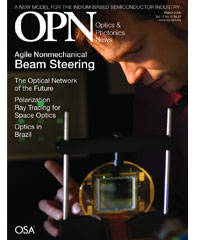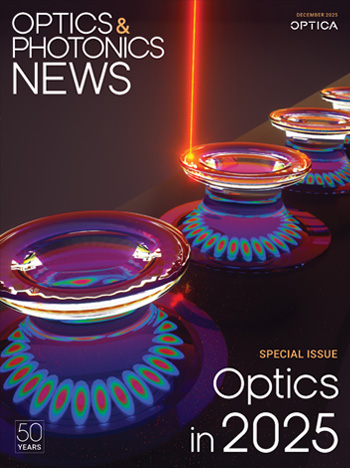
March 2006 Issue
Feature Articles
Agile Nonmechanical Beam Steering
The day is coming when engineers will be able to replace mechanical complex gimbal and steering mirror assemblies in electro-optical systems with thin, conformal devices that either have no moving parts or only make use of micro-motion.
by Paul F. McManamonThe Optical Network of the Future
The ubiquitous wireless Wi-Fi local-area-networks (LANs) that we enjoy today can accommodate new users and changing conditions in a robust, automated manner. How can we create similarly self-managed optical networks?
by Alan E. WillnerFor Brazilian scientists, optics is considered a leading field in technology transfer. The discipline plays a large role in the country’s ongoing scientific revolution.
by Vanderlei S. Bagnato and Carlos H. de Brito CruzPolarization Ray Tracing for Space Optics
Polarization ray tracing made its debut as a bona fide feature of optical design and analysis software about 20 years ago. This article “traces” how one of the first industrial strength automated PRT capabilities was created.
by Eugene WaluschkaDepartments and Columns
A New Model for the Optoelectronic Indium-based Semiconductor Industry
Foundry-based companies have driven the silicon semiconductor industry to huge success. Could a similar approach work in the struggling indium- based market?
Reminiscences from A. Francis Turner
Francis Turner died in 1996 at the age of 89. He wrote down his reminiscences of OSA in 1973; they are presented here.
Homeland Security Seeks Help from Optics
Science—especially optical science—shows great promise for helping federal offi cials to protect Americans against terrorism. In December 2005, OSA held a conference in Washington, D.C., that explored optical solutions to homeland security.
Undergrads Show their Stuff at FiO Research Symp
Last year, a group of undergraduates held their own as they presented research amidst world-renowned physicists and Nobel-prize winners. The Symposium for Undergraduate Research at the annual Frontiers in Optics/Laser Science meeting showcased the contributions of the next generation of optical scientists.
Why does the phrase “once in a blue moon” mean “rarely”? Is it because, on unusual occasions, atmospheric conditions conspire to create a moon that appears blue? Or does a “blue moon” occur when there are two full moons in a single month—another uncommon occurrence?
The staff of Optics & Photonics News would like to invite you to participate in our first-ever After Image photography contest. As our devoted readers know, the After Image column appears regularly on our back page and consists of a large, full-page image that demonstrates some aspect of the field of optics, or an image that was created using optical equipment.
Also in this Issue
Sweeping crepuscular rays created by cloud shadows in scattered sunlight.


![Manual probe system with needles for test of semiconductor on silicon wafer. [A. Morozov / Getty]](https://opnmedia.blob.core.windows.net/$web/opn/media/images/articles/2025/1125/departments/202511-cover-web.jpg?ext=.jpg)
![Researcher Clara Saraceno in the lab. [Image by Carsten Behler Photography]](https://opnmedia.blob.core.windows.net/$web/opn/media/images/articles/2025/1025/departments/202510-cover-web.jpg?ext=.jpg)
